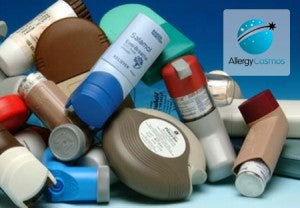You might wonder: are asthma medications addictive? Asthma treatments are not addictive in the usual sense of the word – they are necessary to manage your asthma. But asthma medications are powerful drugs so it is important to understand them and use them effectively.
The most commonly used medications for asthma come in inhaler form. These devices deliver the asthma drug directly to the lung, where it is needed. There are two types of asthma inhalers – preventers and relievers.
Preventer asthma inhalers are usually colored brown, orange or red. They are taken daily over a period of time to ward off an asthma attack and keep asthma under control.
Reliever asthma inhalers are usually colored blue. They relieve the symptoms of an asthma attack, acting within minutes of the onset of symptoms like wheezing or shortness of breath.
Asthma inhalers can also be classified by design and mode of action. The usual types are:
- Metered-dose inhaler – this consists of a small can with a mouthpiece; if you press, it delivers an accurate dose of the asthma drug into your lungs and is the most widely used asthma inhaler.
- Metered-dose inhaler with spacer – this has a plastic part (the spacer) attached to the can which makes it easier to inhale the dose. This type of asthma inhaler is easier for kids to use.
- Dry powder inhaler - this asthma inhaler does not use a propellant, unlike the two systems above. It requires a quick, fast breath to inhale the drug from its container.
There are many variations in the type of inhaler and it is important to know how to use the one you have been prescribed.
There are two types of drug used in asthma inhalers. A bronchodilator, like salbutamol, allows your airways to expand, so you breathe more easily during an asthma attack, this is used in a reliever asthma inhaler. Both short and longer-acting bronchodilators are available. A steroid is a drug that reduces inflammation and would usually be found in a preventer asthma inhaler.
The dose of a drug you get from an asthma inhaler is lower than with a tablet and side effects, therefore, should be less likely. Sometimes sore throat or hoarseness occurs with use of an asthma inhaler (persistent hoarseness is a 'red flag' symptom that should always be reported to a doctor for further investigation).
The asthma inhaler you use depends on various factors, including personal preference. Some people with asthma manage well on just preventers, while others need a reliever as well. Use of an asthma inhaler should always be part of an asthma management plan supervised by your GP or asthma specialist nurse.
Here are the names of some common asthma inhalers (there are many more):
Ventolin (salbutamol – a bronchodilator)
Bricanyl (terbutaline – a bronchodilator)
Serevent (salmeterol – long-acting bronchodilator)
Beclazone (beclometasone – a steroid)
Flixotide (a steroid)
Seretide (salmeterol and others – a combination of drugs)




